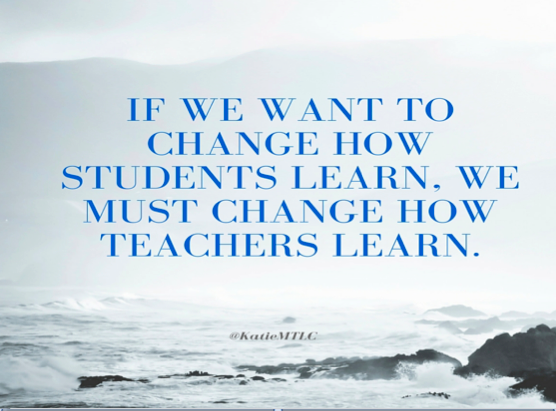 Although researchers and practitioners alike have advocated for the need to change traditional stand and deliver and episodic professional development models, there has long been a disconnect in practice. There is wide agreement that professional learning should be job-embedded, collaborative, involve models and ongoing opportunities for coaching and feedback, yet many teachers still are required to attend sessions on the latest programs or initiatives without adequate support or guidance to impact the desired learning and student outcomes. A new report from TNTP, The Mirage, defines this problem and argues that “school systems fail to help teachers understand how they need to improve– or even that they need to improve at all.”
Although researchers and practitioners alike have advocated for the need to change traditional stand and deliver and episodic professional development models, there has long been a disconnect in practice. There is wide agreement that professional learning should be job-embedded, collaborative, involve models and ongoing opportunities for coaching and feedback, yet many teachers still are required to attend sessions on the latest programs or initiatives without adequate support or guidance to impact the desired learning and student outcomes. A new report from TNTP, The Mirage, defines this problem and argues that “school systems fail to help teachers understand how they need to improve– or even that they need to improve at all.”
For many educators this is no surprise as professional development and teacher evaluation are often seemingly disconnected and haphazard. This traditional system (or lack there of) is not meeting the needs of the majority of teachers and largely fails to change classroom practices. In order to make sure that students develop the skills, knowledge and mindsets that they need to compete in a global world, we need to revisit measures of success for teachers and students to ensure we are all working towards a larger goal that meets the needs of all learners.
If we are truly going to redefine professional learning we need to create systems and structures that help teachers understand what they need to learn, determine goals and define clear measures of success linked to student outcomes- not to be read as “standardized test scores”. First we must define what exactly it is that we want teachers to know and do so that they have clear expectations and then support can be aligned to ensure they are making progress on the shared expectations.
Once clear expectations are established, we need to reevaluate the way in which teachers are expected to learn and develop their practice– are you training people and creating learning opportunities? Foundational to this is understanding that teachers have learned about teaching from their own experience as students, during their preparation programs and especially on-the-job experiences. The models that teachers have had in their past impact their beliefs about learning and how they teach. To create new learning experiences for students, and leverage the resources that exist today that many teachers have not had experience learning with, teachers must experience new ways of learning.
Clear expectations and diverse opportunities to learn are critical but the accountability of such expectations can be a delicate balance. In an effort to ensure that a system for professional growth is aligned to a shared vision and common goals, while allowing for it to be learner-driven, I often wondering about the following questions:
- What systems and structures best support a balance of district and teacher goals?
- How do we help ensure teacher development allows for teacher inquiry that fosters action and continuous learning?
- How might we support teachers to identify and pursue personalized learning opportunities that clearly align to the district vision and expectations?
- How might we shift a system of accountability from seat time to competence?
I’d love to hear your thoughts and ideas in the comments.


Katie, You raise questions that I’ve been asking myself as well! I think that Districts have to model approaches in PD that are learner-centered, interactive and engaging if there is an expectation to see that in classrooms. It is a work in progress for us. We are doing great when it comes to working in networks with teachers because we engage in collaborative inquiries: a structure of PD that is determined and led by the participants in an iterative process and which involves admin, teachers, and consultants learning alongside one another. Recently, at our District, a group of consultants hosted an Inquiry Cafe whereby teachers showcased some of the inquiries happening in their classrooms and participants were really excited by the flexibility & choice of this approach. In one of our Curriculum/Tech initiatives participants choose their own sessions based on interest and need. Where it breaks down for us is District-wide PD days! Often these are Ministry-mandated (not sure how it works for you there) and planned by the District to be implemented by schools in a train-the-trainer model. There has got to be a better way! No one has ever attended one of those and said,” Wow, awesome learning, I’m going to use this same approach in my class tomorrow!” And it’s the very didactic approach to learning that we don’t want to see! Loved John Spenser’s post about making as a form of PD: http://www.spencerideas.org/2015/07/professional-development-as-maker-space.html and am hoping to use that model a bit more in our District. Looking forward to seeing what other ideas people share to help with a much needed shift in practice.
Jennifer- I love the inquiry based model and everyone learning together! It seems all too common and unfortunate to still have new approaches to learning alongside “the one size fits all” approach. Instead of letting go, we ask teachers to do more.
Jennifer– Re envisioning how teachers learn is a very important thought you brought about.
Today some educators are willing to learn and improve as per the technology advancement,but some are not aware how interesting can teaching be and interactions with the students and build and develop innovative ideas into the education system.
Dhanu